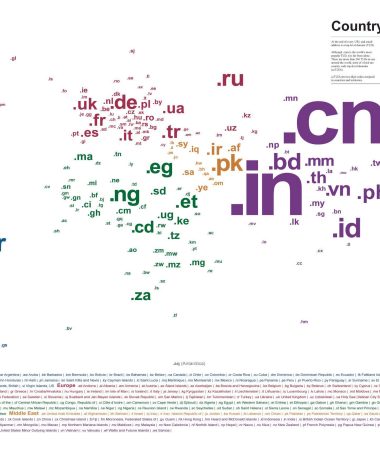Domain flipping is the practice of buying and selling domain names with the intent of making a profit. It is akin to real estate investing, where investors buy properties with the intention of selling them at a higher price. In the case of domain flipping, the domain names are the properties, and the marketplace is the vast expanse of the internet.
Understanding Domain Names
Before diving into domain flipping, it is essential to understand what domain names are. A domain name is an address where internet users can access a website. It’s a string that translates the complex IP address into a human-readable form, making it easier to navigate the web.
What Is Domain Flipping?
Domain flipping involves three major steps: buying, holding, and selling domain names.
Buying: The first stage is identifying and purchasing a domain name that might be valuable in the future. This involves market research, trend analysis, and understanding what makes a domain name valuable.
Holding: Once purchased, the investor may develop the domain by creating a website or simply hold it, betting that its value will increase over time.
Selling: Eventually, the domain flipper sells the domain to a third party for a profit. The sale might take place through various platforms, specialized in domain transactions, or even directly between the buyer and the seller.
Why Do People Flip Domains?
Profit Motive: Just like any other investment, domain flipping can be lucrative. Some domain names appreciate significantly in value, leading to substantial profits.
Business Needs: Companies, both existing and emerging, are always in search of the perfect domain name. A domain that aligns with a brand or contains popular keywords can be valuable.
Trends and Fads: Some domain flippers invest in names that align with emerging trends or technological advancements, betting that these domains will become valuable as the trend grows.
How to Flip Domains
Research: Understanding the market and identifying potential valuable domains is key. Tools like Google Trends and keyword analysis software can assist in this process.
Purchase: Buying the right domain at the right price is essential. Various platforms like GoDaddy, Namecheap, or specialized auction sites are popular places to buy domains.
Development: Some flippers develop the domain by creating a website, enhancing its value.
Marketing: If you’re holding a valuable domain, letting potential buyers know it’s for sale is vital. This can be done through various domain marketplace websites or targeted outreach.
Negotiation and Sale: Selling a domain involves negotiation. Understanding the legal aspects, including contracts and transfer procedures, is important.
Risks and Challenges
Domain flipping is not without risks. Market trends can change rapidly, and what seemed like a valuable domain today might lose its value tomorrow. There are also legal considerations, such as trademark infringement, that must be carefully navigated.
Domain flipping is an exciting and potentially profitable online business venture. However, like any investment, it requires research, insight, patience, and a clear understanding of the risks involved.
Those looking to enter this field must be prepared to invest time and effort into understanding the market, identifying opportunities, and navigating the complex landscape of online domain buying and selling. With careful planning and a strategic approach, domain flipping can be a rewarding way to leverage the ever-evolving digital landscape.
Let’s continue by exploring the top 10 platforms where you can buy or sell domains. These platforms play a pivotal role in domain flipping, providing the essential marketplace for transactions.
1. GoDaddy Auctions
Overview: GoDaddy is one of the largest domain registrars globally and offers an auction platform for buying and selling domains.
Features: Advanced search filters, various bidding options, and extensive customer support.
Pros: Wide audience reach, user-friendly interface.
Cons: Some fees involved in listing and selling.
2. Sedo
Overview: Sedo is a global marketplace that specializes in domain buying, selling, and parking.
Features: Offers domain appraisals, broker services, and an extensive network of buyers and sellers.
Pros: Secure transactions, large international market.
Cons: Commission-based fees.
3. Flippa
Overview: Flippa focuses on selling startups and websites but also offers domain auctions.
Features: Detailed statistics, seller ratings, and a variety of payment options.
Pros: Good for bundled sales with websites, transparent process.
Cons: Listing fees and success fees.
4. Namecheap Marketplace
Overview: Namecheap’s marketplace is a good place for beginners to buy and sell domains.
Features: Easy listing process, integration with Namecheap registrar services.
Pros: Lower fees, user-friendly interface.
Cons: Smaller audience reach compared to others.
5. Afternic
Overview: Afternic, owned by GoDaddy, is a well-known platform for domain aftermarket services.
Features: Network of over 100 resellers, fast transfer service.
Pros: Broad exposure, professional support.
Cons: Commission fees.
6. SnapNames
Overview: SnapNames specializes in snapping up expired domains and offers them for auction.
Features: Daily auctions, backordering service.
Pros: Great for acquiring expired domains, extensive inventory.
Cons: Competitive bidding environment.
7. Dan.com
Overview: Dan.com focuses on making domain buying and selling simple and transparent.
Features: Customizable landing pages, secure escrow service.
Pros: Low fees, clear communication between buyer and seller.
Cons: Limited marketing options.
8. NameJet
Overview: NameJet offers expired and premium domain names through auction.
Features: Backorder services, advanced search.
Pros: Access to premium domains, transparent auction process.
Cons: Higher competition, fees for sellers.
9. Dynadot Marketplace
Overview: Dynadot provides a marketplace in addition to its registrar services.
Features: Easy listing, integration with Dynadot’s other services.
Pros: Convenient for Dynadot customers, low fees.
Cons: Smaller reach.
10. Epik
Overview: Epik offers a full suite of domain services, including a marketplace for buying and selling.
Features: Secure transactions, domain leasing options.
Pros: Offers additional services like hosting and design, flexible payment options.
Cons: Less well-known than some competitors, variable fees.
Choosing the right platform for buying or selling domains depends on various factors such as fees, audience reach, additional services, and personal preferences. Some platforms offer additional features like appraisals or broker services, while others are more suited for beginners.
By understanding what each platform offers, sellers and buyers can make informed decisions that align with their goals and needs. Domain flipping, though challenging, can be made smoother and more efficient by leveraging these platforms.
Whether a seasoned domain investor or a novice looking to dip a toe into the domain flipping world, these platforms provide the tools and marketplace to make domain transactions possible and profitable.
Assessing the fair value of a domain is essential in the domain flipping industry. Whether you’re buying or selling, understanding the true worth of a domain can make or break a deal. Here are the top 10 sites where people can check the domain’s fair value:
1. EstiBot
Overview: A widely-used domain appraisal tool that provides instant domain appraisals and valuable insights.
Features: Bulk appraisal, search analytics, trademark protection.
Pros: Comprehensive data, API access.
Cons: Free usage is limited; subscription required for full access.
2. GoDaddy Domain Appraisal
Overview: GoDaddy offers a free tool to assess the estimated value of a domain.
Features: Uses AI and big data to provide valuation, includes comparable sales.
Pros: Free, quick, and easy to use.
Cons: May favor GoDaddy’s marketplace.
3. NameBio
Overview: NameBio is a searchable database of historical domain name sales.
Features: Sales history, advanced search filters, market reports.
Pros: Extensive historical data, valuable for trend analysis.
Cons: Doesn’t provide a direct appraisal; research-based.
4. DomainIndex
Overview: This service provides appraisals, analytics, and other domain-related tools.
Features: Portfolio management, SEO stats, trademark research.
Pros: Wide range of tools, multi-language support.
Cons: Some features require a subscription.
5. Sedo Domain Appraisal
Overview: Sedo offers professional domain appraisals as a paid service.
Features: Detailed reports, provided by domain experts.
Pros: Human-driven analysis, customized appraisals.
Cons: Costs involved, not instant.
6. DomainsBot
Overview: DomainsBot provides analytics and data necessary to make informed decisions.
Features: Domain suggestions, market analysis.
Pros: Good for research and market understanding.
Cons: More focused on domain discovery than appraisal.
7. Flippa Valuation Tool
Overview: Flippa provides a free valuation tool specifically for domains listed on their platform.
Features: Incorporates previous sales data, market trends.
Pros: Free and easy to use, integrated with Flippa’s platform.
Cons: Specific to Flippa’s marketplace.
8. Epik Appraisal
Overview: Epik offers a free tool that provides quick domain name appraisals.
Features: Instant valuations, bulk appraisal.
Pros: Free, user-friendly.
Cons: May be less comprehensive than other tools.
9. DomainWorth
Overview: DomainWorth offers detailed insights and analytics for domain valuation.
Features: Risk assessment, SEO metrics, traffic data.
Pros: In-depth analysis, combines various metrics.
Cons: Requires subscription for full access.
10. Valuate
Overview: Valuate provides free instant domain appraisals using an algorithm that considers various factors.
Features: Bulk appraisal, integration with EstiBot’s data.
Pros: Free and quick, good for rapid assessments.
Cons: Less detailed compared to some other tools.
Domain valuation is a complex process that requires considering various factors such as domain age, keyword popularity, overall market trends, and comparable sales. The above platforms provide different approaches to valuation, from quick automated appraisals to detailed human-driven analysis.
While these tools provide valuable insights, it’s essential to remember that they offer estimates, not definitive values. The real value of a domain might be influenced by factors such as the buyer’s specific needs or seller’s negotiation skills.
Combining the insights from these tools with personal judgment and market understanding can lead to successful domain transactions, whether you are entering the market as a buyer or a seller.










